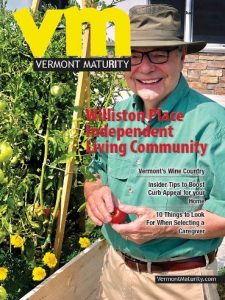
Benjamin Franklin, the venerable Founding Father who died in 1790 at the age of 84, once said that “life’s tragedy is that we get old too soon and wise too late.” Like all great quotes, it’s one that has only grown in resonance with the passage of time.
Franklin – one of the richest men of his era – had the good fortune to be nursed by family at his Philadelphia home during his fading days. Yet for many less prosperous seniors, the prospect of ending up penniless in a nursing home might seem as certain as death or taxes – two other subjects on which Franklin waxed poetic.
But does it have to be that way? Might there not be a way for low-income seniors to live out their waning years in the comfort of their own homes? According to Stephen Unsworth, an Essex Junction-based attorney who specializes in estate planning and elder law, there is.
“Vermont has something called ‘Choices for Care,’” Unsworth said. “Vermont recognized that it is cheaper to keep people in their homes and send somebody to them than put them in a nursing home.”
Under the provisions of Choices for Care, Vermont seniors are given equal access to either nursing facility or home and community-based care, depending on their choice.
“Whether you want to get services in a nursing home, a residential care home or the community, you still have to complete the same application,” said Jackie Majoros, the State Long-Term Care Ombudsman for Vermont Legal Aid, a non-profit law firm that provides free civil legal services to Vermonters who are low-income, elderly or have disabilities. “It’s the same rules, the same clinical criteria and the same financial criteria, and I think some people don’t understand that.”
Choices for Care is a Vermont-specific component of Medicaid, a social insurance program created in 1965 by the U.S. government that provides financial assistance for long-term care. Unlike Medicare, which is funded entirely at the federal level and is available to anyone over the age of 65, Medicaid is administered at the state level and is a need-based program.
“Medicaid is need-based, meaning you can only have a certain amount of assets (to qualify for the program),” Unsworth said. “Some things don’t count as assets, like a single-family house if it’s under $500,000 or a burial plan up to $10,000. A car won’t prevent you from getting Medicaid, nor will your personal property like your television or bedroom furniture. But if you owned a Picasso, that would be counted (as an asset).
“A married couple can have $111,000 in assets (if one spouse requires long-term care),” says Unsworth. “That includes (among other things) cash, stocks, life insurance policies, annuities, stocks, bonds and CDs. But for a single person, it’s only $2,000.”
Individuals or couples who can’t afford long-term care on their own but who don’t qualify for Medicaid because they exceed the asset limits are often required to “spend down” their assets before they can receive Medicaid assistance. But as Majoros points out, people often misunderstand the spend-down rules as they apply to married couples.
“We’ve seen a lot of people who are married come to us with limited resources because they haven’t gotten good advice and they thought they had to spend down (their assets) to the $2,000 level,” Majoros said. “It leaves the (surviving) spouse in a bad position financially.”
Catherine Collins, Director of Case Management with the Champlain Valley Agency on Aging (CVAA), agreed that there are many popular misconceptions among seniors about Medicaid rules.
“(Medicaid) is confusing. It’s complicated and there’s a lot of misinformation out there,” Collins said. “We still have couples who come to us who say they’re not going to (utilize Medicaid benefits) because it will make them sell their house in order to be eligible, which is absolutely not true.”
Another concern many seniors have when considering Medicaid assistance is the ability to leave their house to their heirs after death. According to Unsworth, Vermont offers more flexibility in this area than most states.
“In other states, the house is exempt (from the Medicaid asset test), but when the parties die, Medicaid can then put a lien against the house and want to be reimbursed when the house sells,” said Unsworth. “But Vermont has an exception to that law, and we can presently do a ‘Medicaid Deed’ – also known as a ‘Lady Bird Deed’ – which is a deed where we transfer the interest in the house to the couple’s children, but the children have no rights in the house until both parents die. And while both parents are alive they have the right to revoke the deed or sell the house.
“By using this deed,” Unsworth says, “because of how Vermont law is written, Medicaid loses the right to lien the house. So one of the tools we use the most right now is this special Medicaid Deed.”
However, one aspect of Medicaid law that is unflinching concerns gifting of assets to children.
“When Medicaid first came out, people (attempted to qualify) by giving all their money to their children,” noted Unsworth. “Medicaid became aware of this and different laws have passed, so now there’s a five-year lookback period to prevent you from giving money to your children to qualify for Medicaid.”
Luckily for seniors, there are organizations like Vermont Legal Aid and the CVAA and attorneys like Unsworth to help sift through the intricacies of Medicaid rules and regulations.
“(CVAA has) case management staff and information and assistance staff who help people understand the long-term care Medicaid rules if they’re looking to apply for nursing home care or home and community-based care,” Collins said. “They explain what their options are for long-term care and what the eligibility guidelines are for Medicaid. If the person chooses to apply for long-term care through Medicaid, they help them through the application process.”
This article was contributed by Luke Baynes.
 Related Articles & Free Subscription
Related Articles & Free Subscription
Extra Help Program Helps Seniors With Their Medication Costs






Comment here